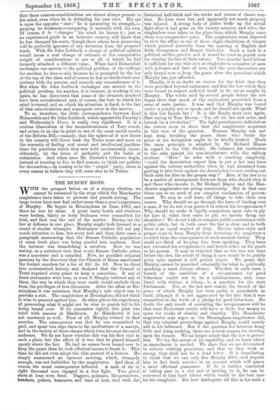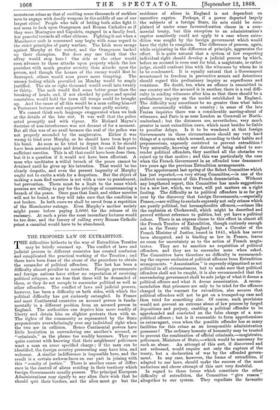THE MURPHY RIOTS.
WITH the prospect before us of a stormy election, we cannot be reassured by the steps which the Manchester magistrates have taken to prevent and punish rioting. The large towns have now had rather more than a year's experience of Murphy. He began in Birmingham in June, 1867, and there he was let alone. A great many heads and windows were broken, thirty or forty Irishmen were committed for trial, and that was the end of the matter. Having set the law at defiance in one place, Murphy might look forward to a round of similar triumphs. Newspaper readers did not pay much attention to him, but every now and then there came a paragraph announcing that the Roman Catholic population of some fresh place was being goaded into madness. Now the lecturer was brandishing a revolver. Now he was stating, as a notorious fact, that every Roman Catholic priest was a murderer and a cannibal. Now, he gratified criminal passions by the discovery that the Church of Rome sanctioned the foulest murders for a fee of 26/. 2s. 9d. Now he dived into ecclesiastical history, and declared that the Council of Trent required every priest to keep a concubine. If any of these statements were true, or even if Murphy believed any of them, the way in which they were made would exclude them from the privileges of free discussion. After the affair at Bir- mingham it was notorious that Murphy's sole object was to provoke a riot. The magistrates at Birmingham did not think it wise to proceed against him. In other places the expediency of preventing what it might not be wise to punish led to his being bound over. If we remember rightly, this plan was tried with success at Blackburn. At Manchester it has not answered so well. First of all, Murphy refused to find sureties. The consequence was that he was committed to gaol, and spent two days there in the meditations of a martyr, and in the society of those classes which form his most favoured audience. We do not know whether this was his first visit to such a place, but the effect of it was that he placed himself openly above the law. He had no sooner been bound over to keep the peace than he took effectual means to break it. This time he did not even adopt the thin pretext of a lecture. He simply summoned an opeu-air meeting, which, strangely enough, was not forbidden by the magistrates. And then, of course, the usual consequences followed. A mob of six or eight thousand men engaged in a free fight. Two pistol shots at least were fired. Daggers, poleaxes, life-preservers, hatchets, pokers, hammers, and bars of iron, vied with the historical half-brick and the sticks and stones of classic war- fare. No lives were lost, and apparently not much property was injured. A strong body of police broke up the actual fight after it had gone on for twenty minutes, and when the ringleaders were taken to the place from which Murphy came there was comparative quiet. The magistrates seem disposed to view the affray as one of those slight ebullitions of temper which proceed naturally from the meeting of English and Irish, Orangemen and Roman Catholics. Such a mob is a political seidlitz powder, and it would be cruel to punish men for obeying the law of their nature. Two months' hard labour is sufficient for one who acts as ringleader to a number of men with poleaxes and bars of iron, and the men themselves are only bound over to keep the peace after the precedent which Murphy has just afforded.
Morally, it is no doubt an excuse for the Irish that they were provoked beyond endurance, and that the law which they were bound to respect suffered itself to be set at naught by Murphy. The words used by several people before the row began show that much of the excitement proceeded from a sense of rude justice. It was said that Murphy was bound under a penalty not to speak, and he should not speak. What is this but Lynch law ? It is the Rugby story over again, East saying to Tom Brown, " I'm all for law and order, and hurrah for a revolution ! " The light punishments inflicted on the rioters seem to show that the magistrates acquiesce in this view of the question. Because Murphy was not kept from breaking the peace, those who broke the peace at his instigation ought to be kindly treated. Much the same principle is adopted by Sir Richard Mayne in regard to the Cab Strike. He balances his tenderness to the cabs against his non-interference with the railway stations. " How," he asks, with a touching simplicity, " could the Association expect him to put a law into force against the railway authorities when he had abstained from putting it into force against the Association for not sending out their cabs for hire in the proper way ?" Now, if the law is to be a matter of arrangement between those who should obey it and those who execute it, Sir Richard Mayne and the Man- chester magistrates are acting consistently. But in that case there can be no need of our complex mechanism of govern- ment. We may as well leave all things to take their own course. Why should we go through the farce of binding over a man, if we do not even proceed to estreat his recognizances ? Why should we make it legally compulsory upon cabs to ply for hire if, when they cease to ply, we merely shrug our shoulders ? We do not wish to compare public convenience with public safety, but in both cases the law is clear, and in both there is an equal neglect of duty. Having taken right and proper steps to keep Murphy from lecturing, the magistrates recoiled from the consequences of such unusual daring. They could not think of keeping him from speaking. They have not estreated his recognizances, and levied either on his goods or his person. It may be objected that as this was not done before the riot, the result of doing it now would be to gratify petty spite against a still pettier object. We grant that Murphy cannot be punished criminally for what is, politically speaking, a most serious offence. Whether in such cases a. breach of the condition of a recognizance for good behaviour ought not to be a misdemeanour, and, com- bined with rioting, a felony, is a question for the next Parliament. Yet, as the law now stands, the breach of the peace of which Murphy has been guilty is punishable in itself, although it is not aggravated by the fact that it was committed in the teeth of a pledge for good behaviour. No doubt the only result of estreating the recognizances will be that some Protestant society will have a little less money to spare for works of charity and chastity. The Manchester magistrates may argue as the Birmingham magistrates did, that any criminal proceedings against Murphy would merely add to his influence. But if the question lies between doing little and doing nothing, there are several reasons for deciding upon the former. We no longer admit that the law is power- less. We try the extent of its capability, and we learn whero an amendment is needed. We show that we are determined to enforce existing provisions, and that be they weak or strong, they shall not be a dead letter. It is humiliating to think that we can only fine Murphy 200/., and require him to find fresh sureties in an amount which will prove a more effectual guarantee. If he is further convicted of taking part in a riot and of inciting to it, he can be sentenced to that hard labour which would be the best cure for his complaint. But how inadequate all this is for such a monstrous crime as that of exciting some thousands of reckless men to engage with deadly weapons in the middle of one of our largest cities! People who talk of letting both sides fight it out seem to look upon Orangemen and Roman Catholics as if they were Montagues and Capulets, engaged in a family feud, but peaceful towards all other citizens. Fighting it out when a Manchester mob is concerned may begin with some regard to the strict principles of party warfare. The Irish were savage against Murphy at the outset, and the Orangemen backed up their champion. But does any one think that the affray would stop here ? One side or the other would soon advance to those attacks upon property which the law punishes with much greater severity than attacks upon the person, and though the houses of the enemy would first be destroyed, others would soon prove more tempting. The uneasy feeling which prevailed on Monday would be amply justified. The six or eight thousand would swell into twenty or thirty. The mob would find some better game than the breaking of heads, and, if not checked by police and special constables, would hold the town till troops could be brought up. And the cause of all this would be a man calling himself a Protestant lecturer and supported by some godly society.
We cannot think such language exaggerated when we look at the details of the late riot. It was well that the police acted promptly and with vigour. Sir Richard Mayne's doctrine of non-interference was not dreamt of for a moment. But all this was of no avail because the zeal of the police was not properly seconded by the magistrates. Either it was wrong to bind over Murphy, or he should have been kept to his bond. As soon as he tried to depart from it he should have been arrested again and detained till he could find more sufficient sureties. This is all that could have been done then, but it is a question if it would not have been effectual. A man who meditates a wilful breach of the peace cannot be detained until he gives up his intention. That would be too clearly despotic, and even the present impunity of Murphy ought not to excite a wish for a despotism. But the object of making a man find sureties is not with a view to punishment, but prevention. There must be a limit to the sums which persons are willing to pay for the privilege of countenancing a breach of the peace. Once pass that limit, and either sureties will not be found, or they will take care that the condition is not broken. In both cases we shall be saved from a repetition of the Manchester outrage. Even Murphy's mother society might pause before paying 5,0001. for the release of its emissary. At such a price the most incendiary lectures would be too dear, and the luxury of calling every Roman Catholic priest a cannibal would have to be abandoned.































 Previous page
Previous page